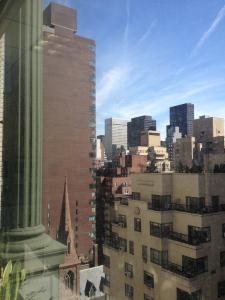Maybe you’ve experienced it too.The sense of change in a large city like New York is palpable.Although I don’t commute in much any more, I noticed it when I made daily treks to the city—change is constant.If the skyline’s forever evolving, on street level things are more than keeping pace.In the seven years of my daily commuting I saw buildings built and razed in the same location.Scaffolding is a constant hazard.Public art pieces are placed and then replaced.Change.I was reading about Yijing, better known as I Ching, the other day.One of the spiritual classics of China, this “Book of Changes” reflects a worldview common in eastern Asia that is quite at odds with that that developed in ancient Greece.Many Greeks believed permanence was reality, those in China who read the spiritual masters believed that change was reality.The older I get the more I think the author(s) of Yijing got it right.

I’m not an expert on the religions of southern or eastern Asia, but I have studied the major ones.To those outside the field of religious studies, it may be surprising that the field is as large as it is.In the United States alone there are an estimated 40,000 denominations, and that’s just within Christianity.To be an expert in any one takes years of study.Add in the many religions of other locations, such as Africa and Asia, and you’ve got more than one lifetime’s worth of work lined up.A common—the most common, in fact—course in collegiate religion curricula is “World Religions.”I’ve taught it myself.The problem is nobody’s an expert in all of them.Still, I found reading about what used to be called “eastern religions” (with that poisonous cultural bias that the unchanging west is the correct vantage point) full of surprises.
Scientists well into last century liked the idea of a steady-state universe.Permanence.When Edwin Hubble noticed other galaxies were moving away from ours (and, by the way, first noticed that there were other galaxies), the Big Bang theory developed to explain this motion. Change, it turns out, is constant.It may be slow at times, and at others it’s like the skyline of a major city like New York, shifting several times in a single lifespan.I’ve read some of the spiritual classics (in translation) and I always come away with a new sense of wonder about the many ways of understanding the world.And I ponder what it will take to change the attitude that religions aren’t worth studying.
